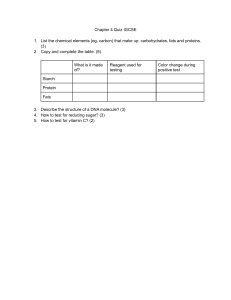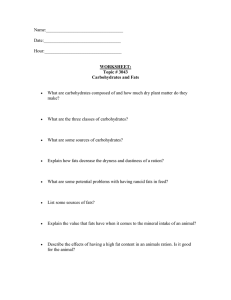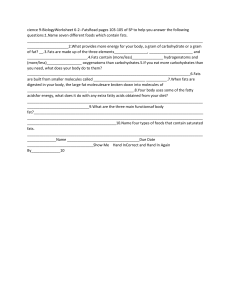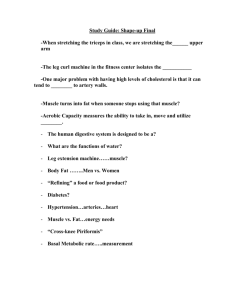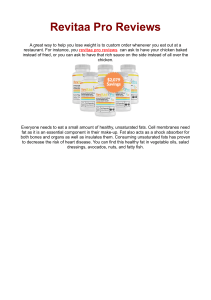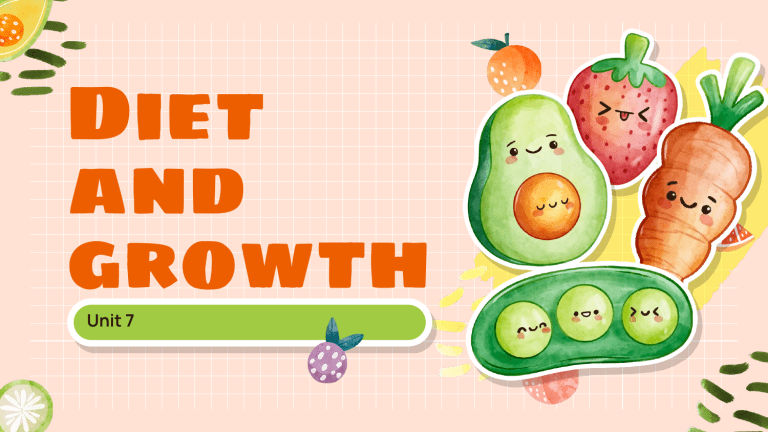
Diet and growth Unit 7 CARBOHYDRATES ● Rice contain a lot of starch. ● Starch is a type of carbohydrate. ● Body break down the starch to make glucose which a fuel that your body use for respiration to release energy. Example of carbohydrates - bread, beans, milk, popcorn, potatoes, sugar Proteins ● Protein is important to make new cells in the body. ● It is needed for the body to grow and heal. ● It is also needed to make haemoglobin and antibodies ● Animal-based foods (meat, poultry, fish, eggs, and dairy foods) tend to be good sources of complete protein, while plant-based foods (fruits, vegetables, grains, nuts, and seeds) often lack one or more essential amino acid FATS AND OILS ● ● ● ● ● Fats and oils are very similar but at normal temperature Fats - solid Oil - liquid Fats and oil give you energy They are also required to make cell membrane animal fats used by humans - buer, suet (beef fat), lard (pork fat), and fish oils. Important vegetable oils - olive oil, peanut (groundnut) oil, coconut oil, coonseed oil, sunflower seed oil, FIVE FOOD GROUPS oil PROTEIN CARBS fat VITAMINS AND MINERALS Energy storage Primary energy resource of the body - carbohydrates and fats Secondary - proteins ● Carbohydrates are stored in lile amount (short term energy stores) - liver and muscle ● Fats are stored in good amount (long term storage) - underneath the skin and around cells some of the body organ. Fat stored in the body provided heat insulation. Animals like seal have thick layer of fat under their skin to keep them warm. VITAMINS Vitamins are nutrients that are needed in small amount but are very essential for the body functions. VITAMIN A (Retinol) Illness caused by its deficiency - Night blindness VITAMIN C (Ascorbic acid) Benefits of vitamin C 1. 2. Help skin to heal quickly Keep blood vessels and bone healthy 3. Give protection against immune system deficiencies 4. Reduce inflammation Deficiency causes Scurvy - Weakness , swelling and bleeding gums VITAMIN D (Calciferol) Benefits of vitamin D 1. Needed for strong bones and teeths 2. Help body absorb calcium from food 3. Blood sugar regulation 4. Improves muscle growth, function and recovery 5. Made in skin when sunlight falls Deficiency causes Rickets - softening and weakening of bones in children Minerals 1. CALCIUM Calcium is a mineral most often associated with healthy bones and teeth it also plays an important role in 1. blood cloing, 2. helping muscles to contract, 3. and regulating normal heart rhythms and nerve functions. 2. IRON Deficiency - Without enough iron, your body can’t produce enough of a substance in red blood cells that enables them to carry oxygen (hemoglobin). As a result, iron deficiency anemia may leave you tired and short of breath WATER FIBRE ● ● ● ● ● Fibre is not actually a nutrient as you can eat it but you cannot digest it. It does not go to your blood or cells of the body It leaves the body as faeces. It helps prevent constipation when the digestive system slows down and faeces collect inside it, instead of being passed out. Fibre is mostly cellulose (therefore mostly plant products) BALANCED DIET A diet that provides all the dierent kinds of nutrients, and the right amount of energy is called as balanced diet. HW - Q1-5 pg 244 of textbook Dierent people need dierent diet ● Young people need more protein to make new cells and carbohydrates to give more energy and a lile bit of fat to make the membrane on the new cells ● People who have to sit down for a lot of the day need less energy so they don’t need as much fat and carbohydrates ● Pregnant women need to eat plenty of protein to help build her baby.She needs iron to make haemoglobin for her and her baby and calcium to build the bones of the baby. DISADVANTAGES OF CONSUMING EXCESS FOOD ● ➢ ➢ Too much sugar Can make tooth decay Increases risk of developing diabetes ● ➢ Too much fat and oil Make you put weight which can put strain on your joint, heart and other body organs. ● ➢ Too much animal fat Increase the risk of developing heart disease. GROWTH AND DEVELOPMENT Cell division is the process by which a parent cell divides into two daughter cells. Textbook question pg 249 EXERCISE AND HEALTH SMOKING Smoking cigaree damages the smoker’s health. Second Hand smoking exposure occurs when people who do not smoke breathe in smoke exhaled by people who smoke or from burning tobacco products. NICOTINE ● ● ● ● Nicotine helps to stay alert . Nicotine is addictive Nicotine damages the blood vessels (makes it narrower) Smokers are more likely to suer from heart diseases. TAR ● ● ● It is a dark and sticky substance It causes lung cancer Cancer happens when cells start dividing out of control and spread to other parts of the body CARBON MONOXIDE ● ● ● ● It is a poisonous gas In the blood it combines with haemoglobin and therefore prevents oxygen from forming a bond haemoglobin Smoker does not get enough oxygen They cannot carry out enough respiration and thus do not have enough energy PARTICULATES ● ● ● ● ● Tiny particles of carbon and other materials is called particulates. They get trapped inside the smokers lungs They make the walls of alveoli breakdown Instead of having millions of alveoli smoker has a lot big spaces This makes it diicult for them to get enough oxygen. TEXTBOOK QUESTIONS PG 251 The skeleton the external skeleton that supports and protects an animal's body is called as an exoskeleton Link - hps://www.youtube.com/watch?v=h5dYvPruBFY JOINTS In an antagonistic muscle pair as one muscle contracts the other muscle relaxes or lengthens. The muscle that is contracting is called the agonist and the muscle that is relaxing or lengthening is called the antagonist. The human body is the most complex system ever created. The more we learn about it, the more appreciation we have about what a rich system it is. CREDITS: This presentation template was created by Slidesgo, including icons by Flaticon and infographics & images by Freepik CREDITS: This presentation template was created by Slidesgo, including icons by Flaticon and infographics & images by Freepik
